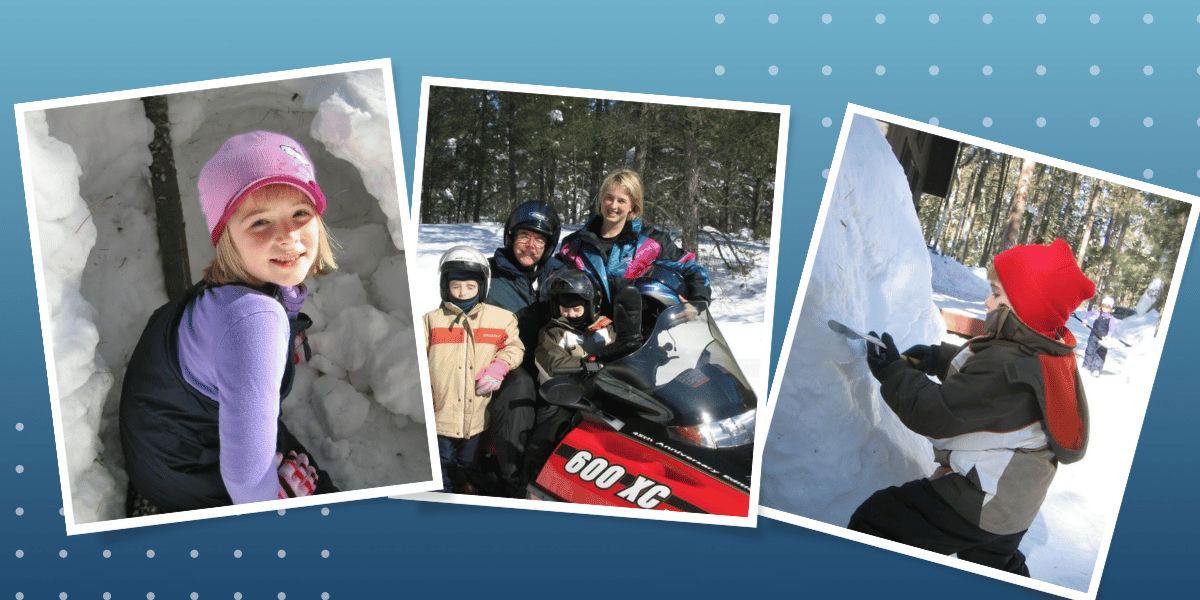How To Stop Being a Snowplow Parent – Part 1
his is Part 1 of a two-part series for those of us parents who just love to help our kids – but maybe just a bit too much.
When our kids were young, Jeff and I took them to the Upper Peninsula of Michigan. One of Jeff’s friends has a cabin in the UP, and we drove through a massive snowstorm to get there. Once it cleared, we had so much fun taking our kids snowmobiling.
Jeff and his buddy would often go in front of us to smooth out the extra bumps, which I appreciated! I found it a bit scary to be at the front, with all the extra bumps and risks.
At the end of one day of snowmobiling, the kids wanted to build igloos, since the snow was so deep. Imagine what would have happened if, instead of letting them, we “went in front of them” by jumping in and saying, “We don’t want you packing all that snow because your hands might get cold. Here, let us build the igloos.”
That would be ridiculous.
And yet, as parents, how often do we do exactly that? It’s called snowplow parenting: Smoothing out our children’s paths so that they don’t get bumped and bruised by life.
Snowplow parenting sounds reasonable – and yet it can create serious risks for our kids in ways we don’t even see. Let’s look at how this plays out, first by seeing how big of an issue this is, and then sharing six steps that will help us stop.
What we do for our kids even as adults: some scary data
First, let’s look at the natural progression if we snowplow our kids through high school: it doesn’t stop there!
A 2019 New York Times poll surveyed parents with adult children ages 18 to 28. Three-quarters of these parents made appointments like doctor visits or haircuts for their adult children. (Um, guilty! I’m the main contact for the neurologist who treats my college-age son’s epilepsy. And this poll made me realize that I probably shouldn’t be!) Eleven percent said they would contact their child’s employer if their child had an issue.
Earlier this year, Pew Research found that 59% of parents with adult children 18-34 gave financial help to a child in that age range in the last year. Among parents who helped their children financially, 36% said doing so hurt their own personal financial situation at least some. And one of the top areas in which young adults got financial help was cellphone bills and streaming services!
What? Are we really sacrificing our 401(k)s so our adult kids can watch Netflix?
Snowplow parenting can stunt our kids in every area from budgeting and organization to sacrifice and handling conflict. To nip this parenting pitfall before our kids hit adulthood, here are the first three of six helpful steps, based on our research with 3,000 teens for For Parents Only and other books.
Step #1: Give your kids freedom to solve problems
It’s one thing to try to make things easier for young kids who don’t understand how to do things. The kids appreciate it, just like we appreciated the guys going in front of us with their snowmobiles to smooth out the snow.
It’s another thing to keep trying to smooth their path by solving their problems as they get older. Our goal as parents should be, as the old saying goes, to “prepare the child for the road instead of preparing the road for the child.”
This becomes especially true in the teenage years – which is when our kids naturally are like eager young horses pulling at the bit, raring to race down that road. According to our research for For Parents Only, in response to a question about how eager they were for freedom, 72% of teens surveyed said they felt like they had to have it and were intensely motivated to pursue it.
It is developmentally healthy and appropriate for young people to jump onto that bumpy road as they move toward independence. This means, by definition, that they need to do things without us. Which also means … there will be bumps and bruises.
As parents, we can support them as they navigate bumps in the road without going ahead to clear those bumps out. (Cold hands and igloos!)
Those of us who are boy-moms need to be especially mindful: teen boys have a particularly strong need to feel trusted to solve problems. This matters to girls too, of course. But my For Parents Only found that teen boys especially longed to feel competent, looked up to, and significant. If Mom rushes to the rescue in handling a bully, for example, he will feel powerless instead of empowered. (This might come out in a sullen or withdrawn attitude – a common signal of feeling incapable and disrespected.)
Step #2: Let your kids make mistakes
As parents, none of us wants to see our kids get a zero on a late assignment, get a speeding ticket, or explain to a coach why they don’t have their practice equipment.
And yet, when their grade suffers, when they have to pay for the car insurance spike because of that speeding ticket, or when they get benched, they build resilience muscles! A little bit of pain when the stakes are low helps them learn and grow. In fact, if you think about it, there is no way to build those muscles other than using them.
Take a dad who I’ll call Scott. Scott’s daughter often procrastinated on her college assignments – to the point of him expressing regular frustration and logging into her school portal to prod her to get them done. I wonder if letting her fail a class and have to retake it at her own expense would have gotten the point across in a more powerful way.
Perhaps more important: Kids who aren’t allowed to fail also don’t realize their own sense of agency. They feel at the mercy of a confusing world. Experts (for example, see this article in Parents magazine) have found that snowplow-parented kids give up too easily, have poor problem-solving skills, and develop “learned helplessness.”
Eventually, these kids don’t fail because they don’t even try.
Maybe it’s time to let our kids (and ourselves) fail. I recently heard of a family who has a “Mistake Monday” routine. At dinnertime, they talk about mistakes they made the previous week. They remind each other that it’s okay and emphasize having grace. I love that.
Step #3: Slow our own pace (rather than doing it for them “because it’s quicker”)
This final point for this week comes to you deep from the heart of a fellow high-capacity parent. Some of us are in a hurry, and don’t leave “parenting margin” in our lives. So we get annoyed when our kids fail or have a problem that slows us down, because it impacts our schedule too.
Think about it this way. When our child was little, it was indeed faster for us to tie their shoes in the morning. But we knew it was so important for that little mind and those little fingers to try it themselves. So we forced ourselves to let our child fumble and try, even though the clock was ticking. And then perhaps maybe we learned the object lesson that we needed to allow an extra ten minutes in the morning, so that we had time for the fumbling and wouldn’t have to jump in. After all, we know allowing our child to do it on their own is so important and will be much better for them in the end.
It’s the same thing ten years later when that same child is struggling in English class. Instead of hurrying things up by rewriting the paper for them, we need to allow the margin to make suggestions and then let them do the rewriting. Allowing our child to do it on their own will be much better for them in the end.
So, what do you think? If you’re like me, you’ve probably already got a list of “but what about ___!?” questions. Yes, there will be many situations in which our kids aren’t yet ready for full freedom – and yet we still need to back off the temptation to snowplow. We’ll tackle that next week in Part 2.
If you are interested in having Shaunti bring research-based strategies, practical wisdom and biblical principles to your next event, please contact Nicole Owens at [email protected].
On our podcast, I Wish You Could Hear This, Jeff and I offer proven steps to help you thrive in your life, faith and relationships. In other words, we’ll offer the practical help you’ve grown accustomed to right here in this blog space. You’ll take away specific steps that help you today. Listen, follow, and share with your friends on YouTube, Apple Podcasts, Spotify and other platforms.
Please note: This post may contain affiliate links. As an Amazon Associate we earn a small amount from qualifying purchases through these affiliate links. This doesn’t cost you anything, and helps us continue bringing you great content!








pinup casino – интернет-казино с богатым ассортиментом игр, привлекательными бонусами и высоким качеством обслуживания для всех любителей азартных развлечений.